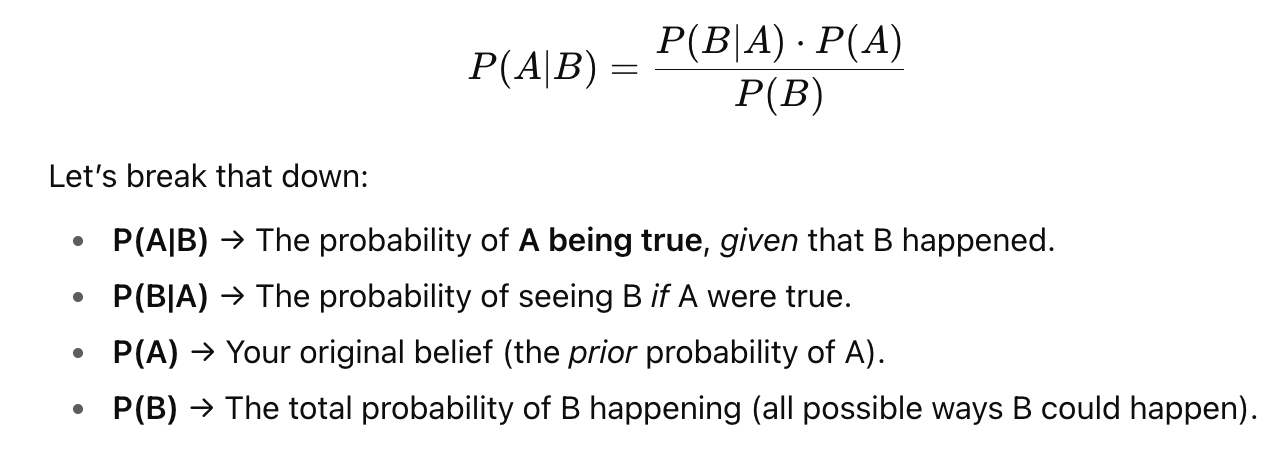How Bayes’ Theorem Helps Me Understand People (and Why I Keep Going to That One Restaurant)
It’s been a while since I wrote here. Not because I didn’t want to. I just didn’t know what I wanted to say.
It’s been a long time since I’ve posted here and I’ve been thinking especially about how we understand people. Or rather, how I try to. Lately, I’ve found myself viewing human behaviour through a strange but oddly comforting lens: Bayes’ Theorem.
If you’ve never heard of it (or forgot it the minute you left your stats class), Bayes’ Theorem is basically a way to update your beliefs when new evidence shows up. You start with a prior what you already think is true and every new piece of information helps you refine that belief. It’s math, yes. But it’s also strangely… human.
The Formula:
Funny thing is, I’ve started realising this isn’t just math. It’s how I navigate life. Especially when it comes to understanding people.
And… food. (Smiling with my teeth wide opened, iykyk)
Let me start with a story.
There’s this all-vegan restaurant called Burma Burma. It’s calm, almost zen-like. There are no animal products on the menu and yet, the food is bold. I walked in the first time with zero expectations. A friend dragged me along, raving about “this incredible Khow Suey.”
My prior belief?
“It’s vegan. It’ll probably be bland.”
Then the Khow Suey arrived.
That rich coconut broth, the way all the textures came together, and just a tiny squeeze of lime that somehow made everything better — it just worked. One spoon, and I found myself raising an eyebrow. Another spoon, and I was recalculating.
Next visit, different dish. Equally amazing.
Third visit, I was the one dragging a friend there.
Fourth, the staff started recognising me.
By the fifth, I wasn’t experimenting anymore. I was loyal.
Not because I blindly trust restaurants, but because each meal gave me new data and I updated my belief.
From “Probably bland” to “One of my favourite places to eat.”
I realised I do this with people too or at least, I try to.
When I meet someone for the first time, I (like most of us) carry in my own assumptions. Maybe they remind me of someone I knew before. Maybe they’re quiet and I assume they’re arrogant. Maybe they’re overly friendly and I think: “Hmm, are you for real?”
These are my priors.
They might be based on instinct. Or past experiences.
But they’re not facts. They’re just starting points.
And then comes the evidence.
They remember something I said two weeks ago.
They show up when they didn’t have to.
They reveal a softer side, or maybe a darker one.
Every interaction becomes new information.
Every gesture helps me update what I thought I knew.
Bayes’ Theorem reminds me:
We’re allowed to change our mind.
In fact, we should.
This also applies when the update isn’t what we hoped for.
We may start with the belief that someone is trustworthy. We give them space, time, energy. But then, little moments of neglect creep in. Dismissive tones. Excuses instead of apologies. A growing distance.
It’s tempting to hold on to our initial belief. “But they’re a good person.”
Bayes gently nudges: Yes, and people can change. The data is telling us something different now.
Updating doesn’t mean we were foolish before. It just means we’re paying attention now.
The more I think about it, the more I see it in my daily life:
I keep going back to Burma Burma, because the Khow Suey has never let me down.
I grow distant from someone I once admired because they stopped showing up.
I forgive someone who snapped at me because, over time, they’ve shown kindness.
I give a colleague the benefit of the doubt not because I’m naive, but because their past actions have earned that grace.
People aren’t spreadsheets, of course. But the principle still holds:
We get better at understanding people when we let new evidence in. Not just the good or the bad but the full picture as it evolves.
We live in a world of hot takes and instant judgments.
Swipe left. Mute. Unfollow. Cancel.
But Bayes invites slowness. Curiosity. A willingness to be wrong and then right again.
It helps me remember:
Assumptions aren’t truths.
People are not fixed versions of themselves.
The kindest thing I can do for others and for myself is update.
So yes, sometimes this looks like trusting someone again.
Sometimes it means walking away.
And sometimes, it’s as simple as saying: “Let’s go to Burma Burma, I swear you’ll love the Khow Suey.”
Because belief, just like taste, is earned. One spoon at a time.





insane! The way you wove math, human behavior, and a dash of humour, I’m floored. Burma Burma should thank you for the free ad. I’m visiting. no doubt.
Woah woah, relation though in article, a great read, thanks